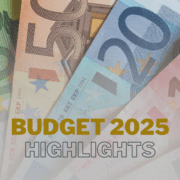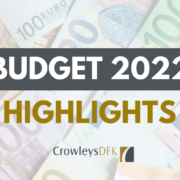Budget 2024 Analysis

Delivering a €14bn Budget package, Minister McGrath described Budget 2024 as a ‘’step change” in planning for the future. As we have navigated through unprecedented challenges – the pandemic, Brexit, the war in Ukraine, and rates of inflation not seen for some 40 years, the Irish economy made a strong rebound in the past 12 months.
However, the continued effects of inflation, capacity constraints in the housing and labour markets and the current cost of living crisis have resulted in a deterioration of living standards for individuals, families and businesses for which today’s Budget contained immediate once-off supports aimed to respond to the acute needs of those who need it the most.
While Ireland continues to generate strong tax receipts, for the first time in several years there is a downward revision for 2023 as compared to earlier projections, which will continue into next year. Whilst the Minister welcomed a projected Government surplus of €8.8 billion for next year, it was acknowledged that our tax receipts must be used wisely to deliver a comprehensive set of financial supports and set the scene for significant future investments in public services such as housing, health, education and transport.
Income tax changes were mainly limited to a threshold increase to €42,000, above which the higher 40% rate of tax would apply, small increases to the main income tax credits and USC rates.
Whilst the Minister confirmed that we will keep our attractive 12.5% corporation tax rate, today’s Budget is set to make a fundamental change in global tax policy with the introduction of a new 15% minimum tax rate for large companies as provided for under the OECD Pillar Two Agreement. This is a once-in-a-generation reform to our corporation tax system, and marks the culmination of a ten-year, global project to reform the taxation of multi-national enterprises.
For the SME sector, we see positive enhancements made to The Employment Investment Incentive Scheme (EII) and the introduction of a new targeted capital gains tax rate of 16% for angel investors when disposing of qualifying investment. The changes will help encourage investment in innovative start-up SME’s and unlock more equity investment in smaller, early stage, businesses that are typically most in need of funding.
The extension of the R&D Tax Credit regime, with an increased tax credit from 25% to 30% is welcomed as Ireland aims to stay competitive in the FDI space.
What was significant though was the Minister’s reference to a “future-proof” of public finances by establishing two new funds to save for future generations. The larger of the funds is the Future Ireland Fund, set to grow to €100 billion by 2035, to assist with paying for the additional health and pension costs associated with Ireland’s ageing population.
The government will also establish a second, smaller €14 billion infrastructure and climate fund, available to catch up on targets to cut greenhouse gas emissions and act as a buffer against capital spending cuts in any future downturn.
It is likely that the one-off support measures will grab the media headlines. However, it is the discussions and outcomes around the changing future tax base to enable us to fund public services and put in place a long-term plan that will make the economic future safer for all.
View the Budget 2024 highlights here.








